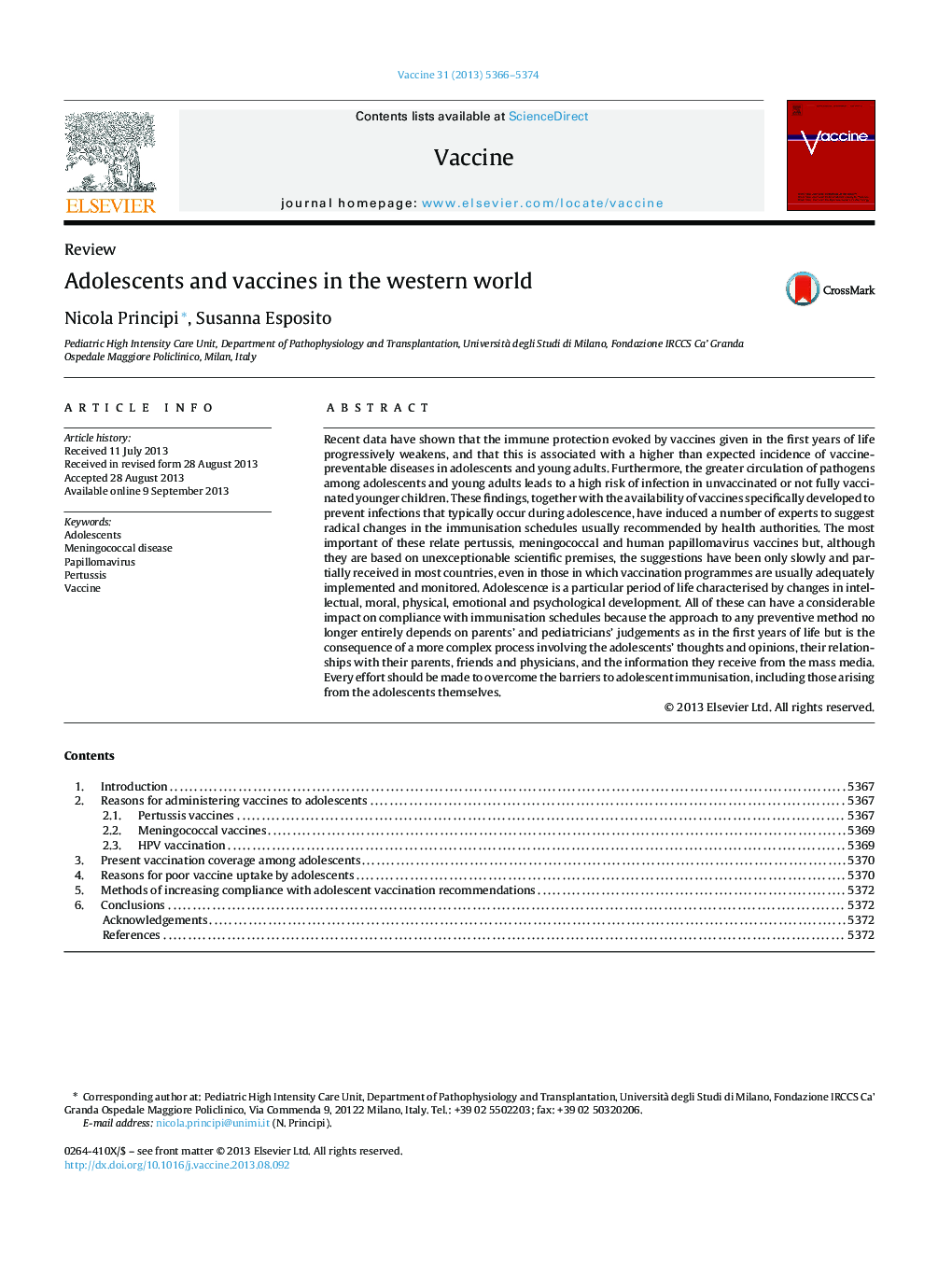| کد مقاله | کد نشریه | سال انتشار | مقاله انگلیسی | نسخه تمام متن |
|---|---|---|---|---|
| 10967444 | 1102831 | 2013 | 9 صفحه PDF | دانلود رایگان |
عنوان انگلیسی مقاله ISI
Adolescents and vaccines in the western world
ترجمه فارسی عنوان
نوجوانان و واکسن ها در دنیای غرب
دانلود مقاله + سفارش ترجمه
دانلود مقاله ISI انگلیسی
رایگان برای ایرانیان
کلمات کلیدی
نوجوانان، بیماری مننگوکوک، ویروس پاپیلوم کورتون واکسن،
ترجمه چکیده
داده های اخیر نشان داده است که حفاظت ایمنی ناشی از واکسن هایی که در سال های اول زندگی به وجود می آید، به تدریج تضعیف می شود و این با میزان بالایی از بیماری های قابل پیشگیری از واکسن در نوجوانان و جوانان همراه است. علاوه بر این، گردش خون بیشتر از پاتوژن ها در میان نوجوانان و جوانان منجر به افزایش خطر ابتلا به عفونت در کودکان جوان و مجددا واکسینه می شود. این یافته ها، همراه با در دسترس بودن واکسن هایی که به طور خاص برای جلوگیری از عفونت هایی که معمولا در دوران نوجوانی رخ می دهد، تعدادی از متخصصان را پیشنهاد کرده اند تا تغییرات رادیکال در برنامه های ایمن سازی که معمولا توسط مقامات بهداشتی توصیه می شود، نشان دهند. مهمترین آنها واکسن های سرفه، مننژیکوک و انسانی پاپیلوما هستند اما اگرچه براساس علایق علمی غیر قابل پیش بینی هستند، پیشنهادات تنها در آستانه و به طور جزئی در اکثر کشورها، حتی در مواردی که برنامه های واکسیناسیون معمولا به طور کامل اجرا و نظارت می شوند، . نوجوانی یک دوره خاص زندگی است که با تغییرات در رشد ذهنی، اخلاقی، جسمی، احساسی و روانی مشخص می شود. همه این ها می توانند تأثیر قابل توجهی بر رعایت برنامه های ایمن سازی داشته باشند، زیرا رویکرد به هر روش پیشگیرانه دیگر به طور کامل به تصمیمات والدین و اطفال در اولین سالهای زندگی بستگی ندارد، بلکه نتیجه یک فرایند پیچیده تر است که شامل نوجوانان "افکار و عقاید، روابط آنها با والدین، دوستان و پزشکان و اطلاعاتی که از رسانه های گروهی دریافت می کنند. لازم است هر تلاش برای غلبه بر موانع برای ایمن سازی نوجوانان، از جمله آنهایی که ناشی از خود نوجوانان است.
موضوعات مرتبط
علوم زیستی و بیوفناوری
ایمنی شناسی و میکروب شناسی
ایمونولوژی
چکیده انگلیسی
Recent data have shown that the immune protection evoked by vaccines given in the first years of life progressively weakens, and that this is associated with a higher than expected incidence of vaccine-preventable diseases in adolescents and young adults. Furthermore, the greater circulation of pathogens among adolescents and young adults leads to a high risk of infection in unvaccinated or not fully vaccinated younger children. These findings, together with the availability of vaccines specifically developed to prevent infections that typically occur during adolescence, have induced a number of experts to suggest radical changes in the immunisation schedules usually recommended by health authorities. The most important of these relate pertussis, meningococcal and human papillomavirus vaccines but, although they are based on unexceptionable scientific premises, the suggestions have been only slowly and partially received in most countries, even in those in which vaccination programmes are usually adequately implemented and monitored. Adolescence is a particular period of life characterised by changes in intellectual, moral, physical, emotional and psychological development. All of these can have a considerable impact on compliance with immunisation schedules because the approach to any preventive method no longer entirely depends on parents' and pediatricians' judgements as in the first years of life but is the consequence of a more complex process involving the adolescents' thoughts and opinions, their relationships with their parents, friends and physicians, and the information they receive from the mass media. Every effort should be made to overcome the barriers to adolescent immunisation, including those arising from the adolescents themselves.
ناشر
Database: Elsevier - ScienceDirect (ساینس دایرکت)
Journal: Vaccine - Volume 31, Issue 46, 4 November 2013, Pages 5366-5374
Journal: Vaccine - Volume 31, Issue 46, 4 November 2013, Pages 5366-5374
نویسندگان
Nicola Principi, Susanna Esposito,
